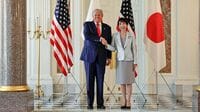TOKYO (Reuters) - Japan's ruling Liberal Democratic Party has omitted the deadline by which it aims to return to a primary budget surplus from its campaign platform, according to a copy obtained by Reuters.
The platform, due to be announced later on Monday, also says the LDP is committed to raising the national sales tax as scheduled in October 2019 and use part of the revenue for childcare and welfare programmes.
The government's original goal was to achieve a primary budget surplus in fiscal 2020, and eliminating the timing of this target could stoke fears that fiscal discipline is slipping away in favour of more big spending.
Abe dissolved the lower house of parliament last month and called a snap election for Oct. 22.
Abe has said he called the election to seek voters' approval of his approach to North Korea's nuclear weapons programme and his plan to use sales tax revenue not to pay down debt but to spend more on education and other popular programmes.
Opposition parties have said Abe is using the election to distract from two cronyism scandals that hurt his popularity earlier this year.
Abe has made spending on education and welfare a central plank of his election campaign and wants to offer free pre-school for children aged three to five and expand education benefits for low-income households.
The platform shows the ruling LDP also wants to spend more on grants for college students and on recurrent education.
The ruling party also pledges to revise the constitution to clarify the role of its military, called the Self Defense Force, and to offer free education and day care to pre-schoolers, the platform showed.
Japan's debt burden is the worst in the world at more than twice the size of its economy, so signs that the government is willing to loosen its fiscal discipline targets so it can spend more could potentially worry investors and economists.
Abe called the general election hoping to keep his conservative Liberal Democratic Party-led coalition's majority in the lower house.
However, his bet now looks increasingly shaky, given growing support for a new party formed by the popular governor of Tokyo, which is drawing candidates from other opposition parties.
(Reporting by Stanley White and Takaya Yamaguchi; Editing by Chang-Ran Kim and Nick Macfie)



